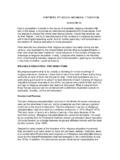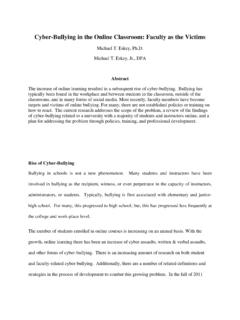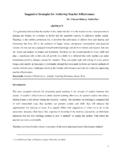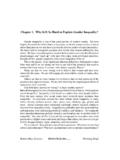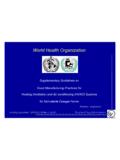Transcription of SOS FOR EMOTIONS - nyu.edu
1 SOS FOR EMOTIONSTOOLS FOR EMOTIONAL health NYUS tudentHealthCenterBE WELL. CARE FOR YOUR EMOTIONAL health !The one thing we all have in common as people is that we are emotional creatures. This is both a gift and sometimes a good news is that we can be active in maintaining and fostering our emotional health in good times and bad through a variety of practical strategies. It may seem like a lot of effort at first, but with time and effort it can be enjoyable and a big confidence booster! 1 WHAT DO YOU NEED HELP WITH IN MANAGING EMOTIONS ? Set a GOAL!-- PREVENTION: Preparing and anticipating difficult times with better coping skills-- REGULATION: Learning how to use less harmful coping strategies when upset-- POST-RECOVERY: Learning to learn from bad experiences and improve coping-- WELLNESS SKILLS: Learning how to improve your emotional resilienceFLIGHT OR FIGHT RESPONSEWhat can makes things even more complicated in managing our EMOTIONS is that when our balance gets thrown off, it can trigger a secondary stress a fear response.
2 FIGHT FLIGHT FREEZE2 EMOTIONAL DISTURBANCE CYCLEN egative Cycles - Positive CyclesWith Emotional Regulation Skills, you can change a negative emotional cycle into a positive step by skill by THE EMOTIONAL DYSREGULATION DOTSTake the mystery out of your EMOTIONS !3 TIPSTo manage our EMOTIONS we can: 1. Improve and strengthen our coping 2. Change our thinking 3. Engage in positive behaviors 4. Respond to and care for our EMOTIONS 5. Reduce stress as well as improve our stress tolerance 45 BEHAVIORAL TOOLSB ehavioral techniques are all about taking action.
3 Here are some common ideas: Take a time out when overwhelmed Pace yourself when feeling stressed Ask for help when stuck Use problem-solving techniques when in a cornerThe idea is: To feel different, you have to do TRAININGAsk New Questions Cognitive Techniques: Managing our self-talk gives us options when upset. Here s what a balanced conversation would sound What am I reacting to? What is it that s really pushing my buttons here? Am I jumping to conclusions? Is there another way of dealing with this? Is it fact or opinion?
4 We all give situations and see things from our point of view. Broaden your perspective and consider the bigger picture. What meaning am I giving this situation? How important will this be 6 months from now?6 COGNITIVE TRAINING:STOPP TECHNIQUEWhen feeling overwhelmed try STOPP! S Stop. Don t act immediately. T Take a deep breath. O Observe. What am I thinking right now? P Pull back. Zoom out. See the bigger picture. P Practice your skills. 78 MINDFULNESSMost people miss out on paying attention to moments in the course of the day, which could provide stress relief, rest, or how to tap into mindfulness skills to manage tough SKILLS TRAININGOur relationships are a common source of emotional stress.
5 It s easy to get into ruts on how we relate to others. Being more aware of how we relate and trying new things can be a great way to manage our needs and subsequent EMOTIONS . Here are some common DBT Ask for what you want Clarify what you need Learn the difference between being assertive versus agressive9 DISTRESS TOLERANCEM anaging and tolerating stress is an ongoing daily requirement. Riding the subway Taking a test Waiting to hear from a job applicationAll require varying degrees of stress tolerance. IMPROVE THE MOMENTA good coping tool is to remember to improve the s see how DBT defines this coping tool.
6 I IMAGERYM Find MEANING in the situation P Engage in PRAYER or MeditationR RELAXATION O Ta k e ONE thing at a time V Take a VACATIONE ENCOURAGE through positive self-statements 10 SELF-SOOTHING TOOLSS oothing through the senses can often provide immediate comfort and distraction. Sounds: Listening to or playing music Smells: Aromatherapy or a relaxing bath Sights: Spending time outdoors Tastes: A pleasurable meal Activity: A positive, absorbing activity: arts & crafts or attending a performance Guided Imagery: VIsualizing a safe placeEMOTIONAL REGULATIONA nyone can feel many EMOTIONS in the course of any given day.
7 Emotional Regulation teaches you how to smooth out the emotional roller coasters of difficult moments. 11 EMOTIONAL TOOLSA Feelings JournalA direct way to keep our EMOTIONS in check is to keep a feelings journal. Using a feelings list such as the one below can help us give a name to a sensation we may be stuck in. Using a feelings list can also help expand our emotional vocabulary for what we are going COPING OPTIONSWhen distressed, it can be helpful to remind ourselves of our OPTIONSWhat can I change? Environment Situation My ReactionsHow can I make the changes?What resources do I need?
8 When can I do it?What do I do first?ACCEPT OPTIONS It is as it is. I don t have to agree with it or judge it as good or bad. I can always come back to it later. I can keep my options open. This is a normal body reaction. I don t have to fight it or try to stop it. It will pass. 13 LETTING GO OPTIONS Ask yourself:Is it worth it?Is this something I can leave or let go of and move on from this experience?Can I learn from this experience?What would I want to do differently next time? RADICAL ACCEPTANCEIn DBT, we learn that to improve our emotional health , it is critical to both accept where we are at the moment and also take a step towards change.
9 1415 STRESS MANAGEMENTA ctive vs. ReactiveAVOID CRASH - BURN - RECOVERY!Effective Stress Management includes: Inside-Out Ex: Walking Outside-In Ex: Meditation Low-Moderate-High Energy exertionPick stress management activities that are doable and accessible. STRESS MANAGEMENT TOOLSR elaxation ResponseWhy is it important to relax and how does it help emotional health ? Reduces emotional fatigue Improves your ability to think clearly Helps with the energy reserve that problems require when trying to solve them16 BREATHER emember - coping can always start with taking a deep breath.
10 It can be a simple yet powerful step to start your COACHINGM emory ToolsHow can you remember to use your skills? Use a memory Tools: Associations Carrying notes with you Email reminders Ex: Use your phone! Enlisting support 17 POSITIVE ACTIVITIESIn Positive Psychology, they promote an idea that we don t have to wait for life to get better to feel a commitment to try something new each t leave your mood to chance. Schedule positive Creative - Dabble in a hobby!Quick Tip: NYU has over 200 clubs!MEDITATION: Take a time out! Give your brain a Meditation Mindfulness Focusing - Felt Sense Prayer Time OutMeditative Activity Cleaning Painting Playing Music In the Zone 1819 FINDING YOUR FORMULA:Emotional Safety PlanWhat would your emotional safety plan look like?

